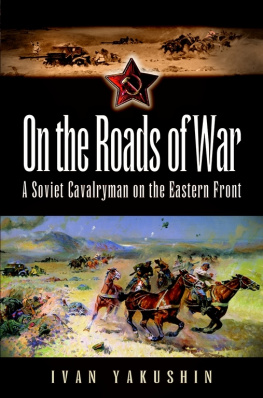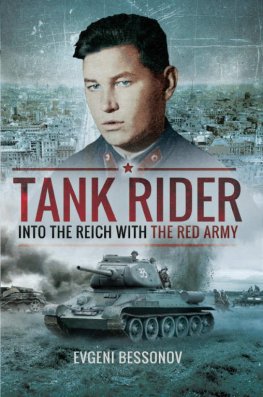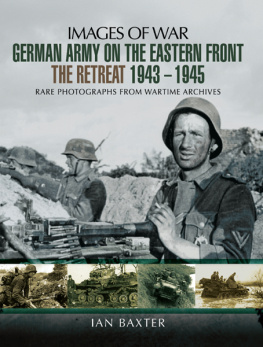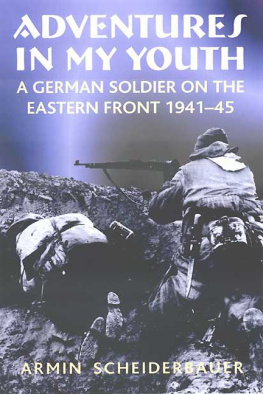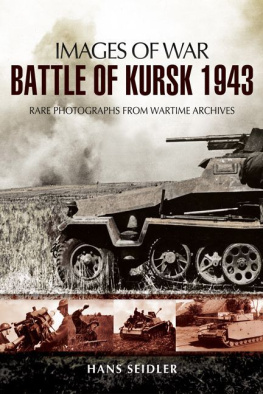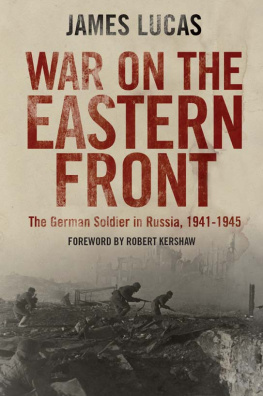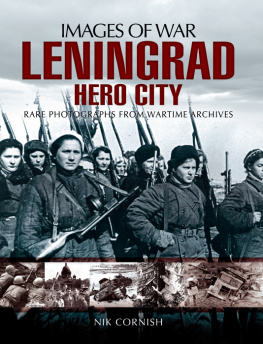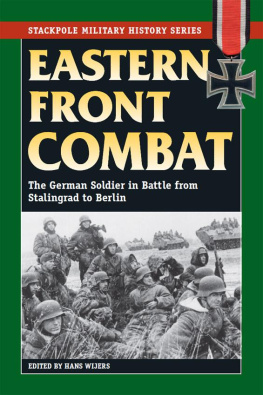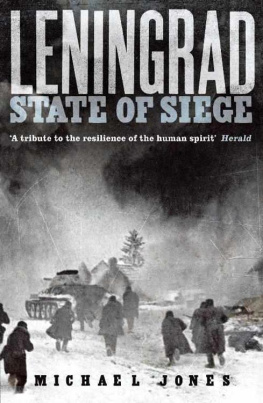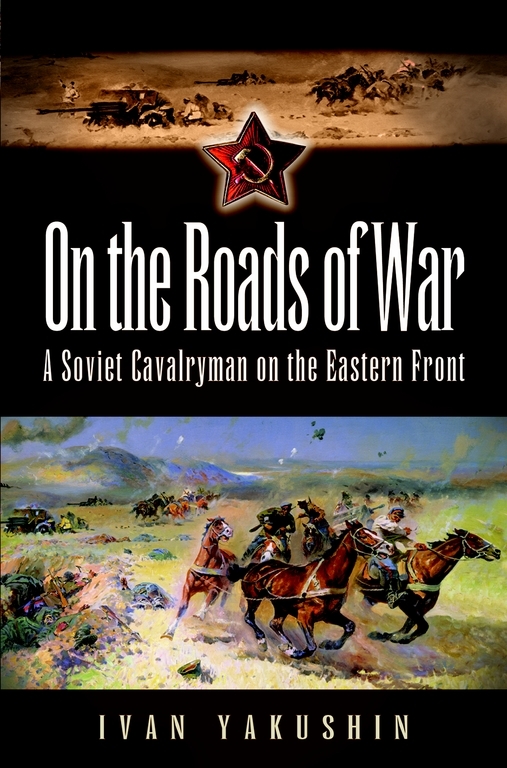Epilogue
For the Red Armys final assault on Berlin, three Soviet Fronts had been assigned, totalling some two and a half million men, 6,000 tanks, 42,000 guns, and over 7,000 aircraft. On 16 April 1945, the First Belorussian Front, under Marshal Zhukov, launched a dawn attack, later supported by Marshal Konevs First Ukranian Front. On 19 April Zhukov reached the outskirts of Berlin, while Konev pushed south of the city. By 25 April Berlin was surrounded and on the same day, the Second Belorussian Front, under Marshal Rokossovsky, pierced the III Panzer Armys line near Stettin. Hitler, hiding in his Berlin bunker, continued to deploy make-believe armies, while the all-too real Red Army annihilated the citys defences. By 1 May Hitler was dead, having committed suicide, and the Soviet Red Banner was fluttering above the Reishstag. On 2 May Berlin officially surrendered to the Red Army, and on 8 May Field Marshal Keitel signed a document of unconditional surrender.
Yakushin and his fellow patients celebrated Victory Day in the Evacuation Hospital, getting drunk on vodka and pure spirit. The following day, he was sent east to Field Mobile Hospital 93, a well equipped unit accommodated in a former German hospital. He was then moved to another hospital at Prenzlau, remaining there until 6 June 1945. On that day, having received a letter from his battery commander, Agafonov, advising him to rejoin his unit and collect an Order of Alexander Nevski (awarded for the last battles in Germany) that was waiting for him, Yakushin quit hospital and hitch-hiked to the Polish border. After being reunited with his regiment, now stationed in Poland, Yakushin received home leave, and set off for Leningrad by train in late June :
The train was so overcrowded, no one could even turn. I was squeezed between a pretty Polish panenka and the girlfriend of an unknown regimental commander. That was quite nice, much nicer than being squeezed between tobacco-smelling Polish travellers, with their huge travel bags. Most of the Polish passengers got off at stops before the border: at last there was more room in the wagons.
The train stopped before the Soviet border and did not budge any further. Accompanied by two other officers, I went to the steam engine to find out the reason for the delay. The only person present in the steam engine was a stoker, who told us the engine-driver and his assistant had gone to have a beer. We followed the stokers directions, and found the engine team propping up a bar, blithely drinking beer, engaged in an apparently endless conversation. We had some beer and went back to the train. An officer approached us and warned us that Soviet border guards were confiscating all handguns from officers. I was not happy about this! I put my pistol into my map case just like I used to do when going to hospital. When the border guards came, I showed them my empty pistol holster, and told them I left the pistol at the regiment.
Eventually, the engine driver and his assistant returned to the train, a long whistle sounded, and we crossed the border into the Soviet Union. I was back in my country, alive and healthy not taking into account my last wound, which had not yet healed and going home to Leningrad!
In the evening we arrived in Lvov, the end of the line for this Polish train. The station was teeming with people. There were no tickets anywhere. People were sleeping in the waiting hall of the station, on the chairs, and on the floor. Most of the stranded travellers were military personnel. Bad news: people had been waiting here for three days and there was no hope of getting tickets. We spent the night sleeping on our luggage.
Next day I wandered round Lvov, admiring its architecture. The city did not look too damaged by war to me. I returned to the station and saw that only senior officers from majors upwards could get tickets for Moscow. I decided to continue my journey on a freight train. Half an hour later, I was on my way to Kiev. I fell asleep to the monotonous sound of the trains wheels, eating up the track. Next to me was a teenager, a boy about sixteen years old. All of a sudden, this boy became agitated and pulled my sleeve, pointing at an open platform on the next railway carriage. There was a man standing there, wearing a military uniform without insignia. Look! He will steal a case now! I did not believe the boy and told him that military personnel were not thieves or robbers: but I prepared my pistol for firing, just in case, and hid it under my greatcoat. I fell asleep again. The boy nudged me once more. I opened my eyes and saw the man in the uniform jump off the train with someones case. I pulled the pistol out and fired. The military man rolled down the railway embankment together with the case.
After another 10 kilometres we arrived at Fastov, a large railway station. The conductor told me the stop would last about thirty minutes. I got off the train in order to stretch my legs. There was a military patrol and I informed them of the incident with the uniformed man stealing the case. A lieutenant, the chief of the patrol, told me it was a common thing. He added that whole gangs of armed men would stop trains in this area, robbing passengers. It all sounded so alien to us, frontoviks . We could not imagine that while good men were at the Front, fighting for the country, some bastards in the rear were robbing helpless passengers.
We arrived in Kiev after some time. Unlike in Lvov, the train station here was still in ruins. The ticket office was closed, besieged by a huge queue. I went to the city, had lunch in a canteen, and returned to the station. There were no tickets for the overcrowded transit trains to Moscow. I spent one more night at this railway station.
In the morning, I heard a message over the loudspeaker: A train to Moscow is being formed... Such trains were dubbed 500th Happy Trains. They were made of railway trucks for cattle, equipped with makeshift wooden bunk beds for passengers. Military personnel did not even need tickets for such trains. The train moved slowly, stopping at every station to let other, more important trains overtake it. There were not so many travellers in my truck. It was nice to sleep on the upper bunk bed. The sliding doors of the truck were opened and the air was full of the fragrance of herbs. My dear motherland! The only thing bothering me was I only had fifteen days of leave, regardless of how long it would take me to get to Leningrad.
Two days later I was in Moscow. I rushed into the metro and went straight to Leningrad station. It was strange, but there was no queue in front of the ticket office. I presented all my papers and expected to hear the standard phrase: sold out. But I got the ticket immediately, and the ticket conductor told me to hurry, as the Leningrad train was leaving in fifteen minutes. I ran to the train. The tortures of travelling in overcrowded trains were over: I was in a comfortable compartment that would take me to my home city.
When I got off the train at Moscow station in Leningrad, I thought for a long time how I should go home. It had been three and a half years since I left my city. Those three and a half years seemed an eternity. The war was the reason. I left the city a schoolboy and had come back a respectable officer, a frontovik , with three decorations earned in battle. In order to be on the safe side, I asked a pedestrian how to get to Pokrovskaya Square, took a tram, and rode through my dear city. Passengers on the tram saw I was a frontovik and almost half of the passengers walked up to me, asking about their fathers, sons, or brothers, who had gone to war. They hoped I had served in the same unit as their relatives, or had heard something of their units. Women were asking me when their loved ones would come back home. A hail of questions fell on me from all sides. I was one of the first frontoviks to reach Leningrad on leave. But what could I tell them, my dear fellow citizens of Leningrad, women who were missing their loved ones so much? There were so many fronts, armies, corps, divisions, and regiments in that war...

